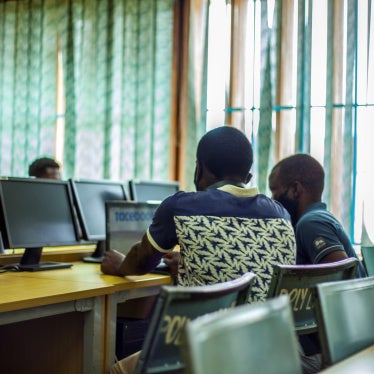Four child soldiers must not be executed by the government of Congo, Human Rights Watch said today.
In a meeting today with the foreign minister of the Democratic Republic of Congo, She Okitundu, Human Rights Watch urged the government to spare the lives of the four children, who were between fourteen and sixteen years of age at the time they were arrested and sentenced to death.
Congo has executed at least one other child soldier, a fourteen-year-old who was put to death shortly after being sentenced in January 2000. The execution of individuals for crimes committed below age eighteen violates the International Covenant on Civil and Political Rights and the Convention on the Rights of the Child, international human rights treaties to which Congo is a party.
Congo's military routinely recruited and used child soldiers under the late President Laurent Kabila. In June 2000, the president announced that the armed forces would demobilize child soldiers and reintegrate them into civil society. But Congo still has approximately 12,000 child soldiers, according to the United Nations Children's Fund.
"International law is clear: No one should be put to death for a crime committed as a child," said Michael Bochenek, counsel to the Children's Rights Division of Human Rights Watch. "Congo should immediately commute these death sentences and bring its practices in line with international standards."
Iran, Nigeria, and the United States are the only other countries known to have imposed the death penalty on juvenile offenders. Iran executed a seventeen-year-old in 1999; Nigeria carried out a death sentence against a seventeen-year-old in 1997 for an offense committed at the age of fifteen. The United States has executed eight juvenile offenders since 1998.
Rehabilitation and reintegration into society are critical issues for children that have participated in armed conflict. Graça Machel, the U.N. Secretary-General's expert on the impact of armed conflict on children, has pointed out that child soldiers may be forcibly abducted, severely brutalized, and compelled to participate in atrocities; they are rarely autonomous actors.
The death sentences against the four children were handed down by Congo's Court of Military Order, which Human Rights Watch criticized in a February 1999 report as failing to safeguard the due process rights of those brought before it. Persons convicted by the court have no right to appeal, and many executions are carried out the same day or soon after the accused are sentenced.
The sole power to commute death sentences rests with President Kabila, who has never used the authority. His father, the late President Laurent Kabila, was known to have granted only two pardons, one for a thirteen-year-old offender sentenced to death in 1998.
The four children facing execution are Diyavanga Nkuyu, fourteen at the time of his arrest; Bosey Jean-Louis, age fifteen when arrested; and Mbumba Ilunga and Mwati Kabwe, arrested when they were sixteen years of age.








